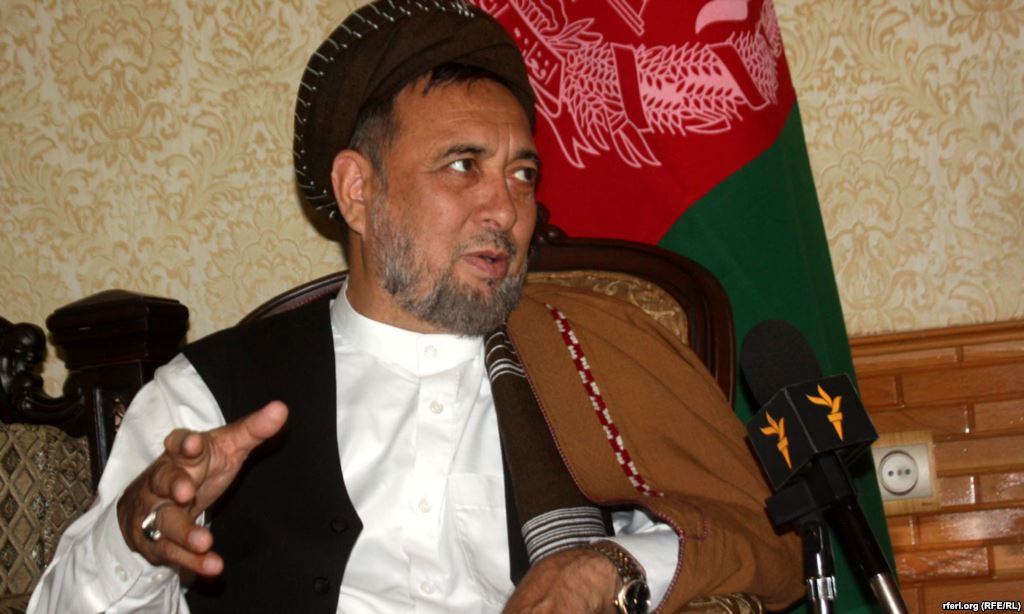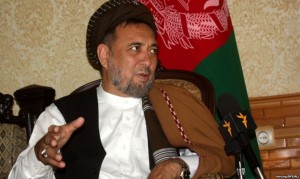Latest News
Pakistan not at level to have agreement with Afghanistan: Executive Office

The second deputy of the executive officer, Muhammad Muhaqiq says it is scheduled that the Jihadi leaders gather at the Presidential Citadel on Thursday to discuss on the treaty.
Muhaqiq assured Afghan people that the NDS_ISI accord is not official yet and just has pointed by the two security deputy of both countries.
Muhammad Muhaqiq in a special interview with Ariananews said that Pakistan has failed in two terms; brining Taliban to the negotiation table and avoiding Taliban spring offensive.
“Pakistan did not stand by its commitments; the country is not at the level that Afghanistan wants to have an agreement with it. The condition for reconciliation of Pakistan’s ties and cooperation has not provided so far,” Muhaqiq said. “The Parliament should be concerned; the treaty still is not valid yet.”
A number of Afghan parliamentarians have severely criticized the intelligence cooperation deal. They say that the agreement would give Pakistan an upper hand in the region. The ISI’s alleged role in providing assistance to the Taliban is also looked down upon by most Afghans, and is one of the reasons why many Afghans are unhappy with the intel agreement.
In a path-breaking deal Pakistan’s premier intelligence agency Inter-Services Intelligence (ISI) and the Afghan intelligence outfit National Directorate of Security (NDS) have signed an accord for cooperation, which is aimed at bolstering fight against terrorism.
“The agreement indicates a change in Afghanistan’s policies. It is now directly approaching Pakistan to maintain regional peace and stability,” Abdul Ghafoor Liwal, an expert on constitutional law said.
It is unclear when this deal was signed, but observers say it came right after Pakistani Prime Minister Nawaz Sharif’s visit to Kabul last week, where he pledged support to Afghanistan in its fight against Islamic militancy.
Ghani also expects Pakistan to use its influence over the Taliban to bring them to peace talks.
The expert, however, admits that President Ghani is taking a huge “political risk” by getting closer to Pakistan knowing that Karzai also tried to build bridges between Kabul and Islamabad but was largely unsuccessful.
“If Ghani’s efforts don’t yield results, and if the war in Afghanistan does not end, it will have policial consequences for the Afghan president,” Liwal warned.
According to a Hezb-e-Islami statement, Pakistan’s Inter-Services Intelligence (ISI) has been directly involved and has played a key role in “destructive activities” in Afghanistan over the past four decades.
The Hezb-e-Islami statement called on the Afghan government not to conclude such agreements in the future, which are against the national interests.
Earlier, former Afghanistan president Hamid Karzai too called on the Afghan National Unity government leaders to immediately scrap the Memorandum of Understanding on intelligence sharing, and said such agreements “which are against the national interests of the country” should not be signed.
According to the MoU, the ISI will train and equip the NDS personnel in their functioning. In addition, Afghanistan and Pakistan will jointly fight terrorism and both institutions will jointly interrogate those accused of any terror incident within their countries.
While the MoU envisages training of Afghan intelligence operatives by Pakistan’s ISI, the Afghan NDS officials have rejected the clause.
NDS spokesman Haseeb Sediqi said the agreement with Pakistan was not against the national interests of Afghanistan and it was concluded based on previous mutual cooperation between the two nations.
The Inter-Services Intelligence (ISI) has been heavily involved in covertly running the military intelligence programs inAfghanistan since before the Soviet invasion of Afghanistan in 1979.
In the 1980s, the ISI systematically coordinated the distribution of arms and financial means provided by the United States’ Central Intelligence Agency (CIA) to some factions of the Afghan mujahideen such as the HeI of Gulbuddin Hekmatyar.
After the Soviet retreat, the ISI and the Pakistan government led by Prime Minister Benazir Bhutto became primary source of supporting the Hekmatyar in his 1992–1994bombardment campaign against the Afghan government and the capital Kabul.
Reported by Farahnaz Forutan

Latest News
Girls’ education is a ‘vital issue’ for Afghanistan: Karzai

Former president Hamid Karzai said in a meeting with Iran’s ambassador and special representative, Hassan Kazemi Qomi, that education of girls was a “vital issue” for Afghanistan.
Karzai said he appreciated Iran’s cooperation and its standing with the Afghan people, especially Iran’s contributions to education in Afghanistan.
During the meeting, Karzai said peace and stability in the region are in the interest of all regional countries.
Latest News
Uzbekistan’s humanitarian aid arrives in Balkh

A shipment of humanitarian aid from Uzbekistan was handed over on Thursday to the local officials of Balkh province in the trade port of Hairatan.
Local authorities said the aid, which includes flour, oil, wheat, sugar and meat, has been handed over by Uzbekistan’s Surkhandarya governor to the governor of Balkh.
The governor of Surkhandarya stated the purpose of sending this aid was to support the people of Afghanistan and stressed the need for the development of good relations between the two countries.
Latest News
Afghanistan’s problems caused more damage to Pakistan than 3 wars with India: Durrani

Islamabad’s special envoy for Afghanistan Asif Durrani said on Wednesday that Pakistan has suffered more due to Afghanistan’s internal situation than Pakistan has suffered in three wars with India in terms of blood spilt and finances drained.
Durrani said at a one-day International Conference titled “Pakistan in the Emerging Geopolitical Landscape”, which was organized by the Institute of Strategic Studies Islamabad (ISSI) and the German Friedrich Ebert Stiftung (FES), that over 80,000 Pakistanis died in the two decades of the War on Terror and that his country was still counting its dead and injured.
“After the withdrawal of NATO forces, it was hoped that peace in Afghanistan would bring peace to the region. However, such expectations were short-lived,” he said.
He also stated that attacks by the Tehreek-e-Taliban Pakistan (TTP) militant group on Pakistan’s border areas increased by 65 percent, while suicide attacks increased by 500 percent.
“The TTP’s enhanced attacks on Pakistan while using Afghan soil have been a serious concern for Pakistan. Another worrying aspect is the participation of Afghan nationals in these attacks,” he said.
Durrani also said Pakistan had suffered geopolitically since the Soviet Union invaded the neighboring country.
“The post-9/11 world order has negatively impacted Pakistan. Apart from losing 80,000 citizens’ lives, including 8,000 law enforcement agency personnel, the country’s economic opportunity cost is estimated at $150 billion,” Durrani said.
Talking about the future outlook for Pakistan in the regional context, Durrani said that while “our eastern neighbor is likely to continue with its anti-Pakistan pursuits, the western border poses an avoidable irritant in the short to medium term.”
However, he said Pakistan can overcome its difficulties with Afghanistan, including the TTP challenge.
-

 Latest News4 days ago
Latest News4 days agoPakistan’s frontiers minister stresses ‘dignified’ return of Afghan refugees
-

 Regional3 days ago
Regional3 days agoIranian president lands in Pakistan for three-day visit to mend ties
-

 Climate Change4 days ago
Climate Change4 days agoMassive river flooding expected in China, threatening millions
-

 Latest News2 days ago
Latest News2 days agoRashid Khan named AWCC’s brand ambassador
-

 Latest News4 days ago
Latest News4 days agoChinese keen to invest in Panjshir-Kabul water conduit project
-

 World4 days ago
World4 days agoTwo Japan navy helicopters crash, one body found, 7 missing
-

 Sport3 days ago
Sport3 days agoKolkata beat Bengaluru by one run in IPL as Kohli fumes at dismissal
-

 Sport3 days ago
Sport3 days agoACL: Aino Mina 3-0 Istiqlal Kabul; Attack Energy 3-0 Khadim

















